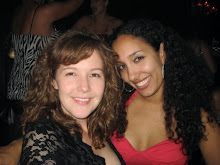Aneya: So Lauren has talked about what it's like to be a minority for the first time in her life, but what we haven't talked about is the complete lack of racism in this country. It's like it doesn't exist here.
Lauren: There really isn't any animosity between different groups of people -- because there aren't different groups. There aren't pejoratives for black people or the migrants from Peru, Bolivia, or Ecuador that the people I talk to know about because those groups are so small it's nothing compared to the big American melting pot. It's just this one societal problem that doesn't exist here.
Aneya: Part of the reason there's no racism here -- there's only one race! Chile is extremely homogeneous, and with the exception of a few Peruvians, and maybe some Germans thrown in, the population largely looks the same. And nobody seems to be treated differently. It's amazing, really. The thought of someone being treated a certain way because of the color of their skin is laughable. They really just don't understand the concept.
Lauren: In talking to people about the lack of racism here, I find myself having to explain the animosity between races in the states. How do you explain things like "white privilege" to people who don't really have the extreme socioeconomic disparities and animosity between races? I mean, there are the Mapuche, but their culture has been embraced in ways that doesn't exist for different cultures in the US. There are those history months, but there isn't a cultural contribution that is recognized daily. A lot of words here are from mapudungun. You see murals and statues of Machi and other Mapuche in public places.
Aneya: For some reason I always forget that I'm not white. I feel white. I have no real connection to my Sri Lankan heritage, and I grew up with a white mom, white brothers, white stepdad. It's only when I feel alienated and looked down upon (basically, when I'm in Utah) that I remember that I'm actually quite dark. I've been reminded of that fact here, too. I've heard men call me "la bonita morena" (the pretty brown one), which seems kind of racist, but apparently here it's a compliment.
Lauren: In the states I was all over Ian Henry Lopez and the Omi and Winant duo, but here I was having a hard time explaining in even the most basic terms why there was racism in the US. People know about slavery, but that was along time ago. Why is it still prevalent 200 years after the abolition of slavery? Why are there cities where you just say the name and you instantly know what the people there look like? Pasadena, Lennox, Inglewood. Why do people cross the street sometimes when a minority is approaching versus a white person? Why do certain people get funny looks when they go into a store? These things don't really exist here, and I couldn't explain why they do in the US.
I asked someone what a pejorative for a Mapuche or migrant Peruvian would be.
"You know. Like if someone wanted to say something mean about a Peruvian just because they're Peruvian. What would you say?" "..." "Oh, you ?" "...Peruvian?" I can name probably 20 racist words without breaking a sweat, and the fact that this hateful vocabulary doesn't exist in the same way here, makes me really embarrassed about this component of life in the US.
Aneya: I'd say I blend in here better than Lauren does. Most people mistake me for Brazilian, which is fine, I'll take it. But they don't treat me any differently. And if they do, it's because they think I'm a tourist, not because of the color of my skin. Lauren, I'd say, gets more flack than I do, because she's white AND she speaks English, she's definitely a Gringa, and a target.
Lauren: Or I'll get called rusia. Whatever. Aneya definitely does have more of a South American look than I do and sometimes I am treated a little differently.
A colectivo will offer to drive me for the low price of $1.300 pesos (about $3USD) when normally it's only $300 pesos. I was buying a bus ticket, but they were all sold out until hours later ... except for the woman standing behind me. For her, she could leave to the same destination immediately. That's nothing compared to how immigrants are treated in the US (because that's what I am here).
Aneya: In any case, it's refreshing to be in a country where people are truly treated equally. I mean, most people. The Indigenous Mapuche community would probably disagree with that. There's definitely some pent up resentment and aggression (and graffiti) from them, but it's not about Chileans being racist, per say. It's about them taking their land. And that's a whole other story.
Lauren: Yeah, I mean I'm no expert on the settlement of Chile and how Mapuches were treated during that time, but an indigenous community exists here. That's a start. People eat Mapuche food, use mapudungun words like choclo, guaguita. That culture is embraced in ways that doesn't exist for indigenous people in the US.
Aneya: Anyway, this is just another reason why we love Chile. The people are truly color blind, and it's fascinating, and heartwarming, to see.
Lauren: I couldn't have said it better myself.
-- Aneya & Lauren

No comments:
Post a Comment